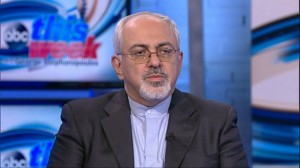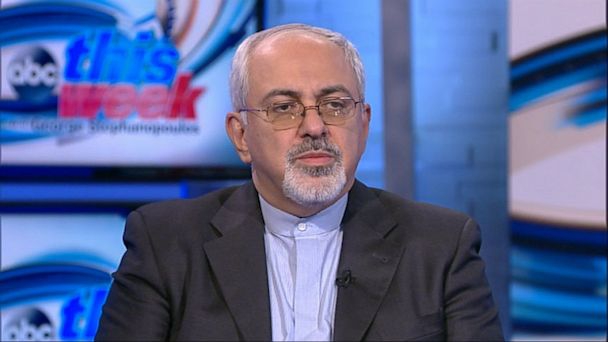 In an exclusive interview this morning on This Week, Iranian Foreign Minister Javad Zarif condemned the Holocaust as a heinous crime and a genocide, dismissing as a poor translation the appearance of the word myth about the Holocaust on the Iranian Supreme Leaders English website.
In an exclusive interview this morning on This Week, Iranian Foreign Minister Javad Zarif condemned the Holocaust as a heinous crime and a genocide, dismissing as a poor translation the appearance of the word myth about the Holocaust on the Iranian Supreme Leaders English website.Iran has been criticized in recent years for the words of its former president, Mahmoud Ahmadinejad, who often denied the existence of the Holocaust, while the phrase the myth of the massacre of Jews appears in a translation of a speech from February 2006 by Iranian Supreme Leader Ayatollah Sayyid Ali Khamanei.
The Holocaust is not a myth. Nobodys talking about a myth, Zarif told George Stephanopoulos on This Week Sunday when asked about the quote. If its there its a bad translation, and its translated out of context This is the problem when you translate something from Persian to English, you may lose something, as the film goes, Lost in Translation, you may lose some of the meaning.
Zarif used his condemnation of the Holocaust to segue into a critique of Israel, which he characterized as the aggressor in the Middle East.
We condemn the killing of innocent people, whether it happened in Nazi Germany or whether its happening in Palestine, Zarif said. [The] Holocaust was a heinous crime, it was a genocide, it must never be allowed to be repeated, but that crime cannot be and should not be a justification to trample the rights of the Palestinian people for 60 years.
Zarif spoke on This Week Sunday following a week of historic moments in U.S.-Iranian diplomatic relations, as new Iranian president Hassan Rouhani visited New York for the U.N. General Assembly.
On Friday, President Obama announced he had spoken on the phone with Rouhani, the first communication of its kind in more than three decades an exchange first confirmed by the newly-elected Iranian president on Twitter. During an exclusive interview with ABCs George Stephanopoulos two weeks ago, President Obama said he had exchanged letters with the Iranian president.
Zarif, who is serving as Irans top nuclear negotiator, met with his American counterpart Secretary of State John Kerry in New York Thursday. Both sides agreed the meeting was constructive, with plans for further talks next month in Geneva.
Zarif said resolution of the nuclear issue will be a first step, a necessary first step, towards removing the tensions and doubts and misgivings that the two sides have had about each other for the last 30-some years.
There has been 34 years of the building up of this mutual distrust, Zarif told Stephanopoulos. We need to move in that direction of removing some of that mistrust, true mutual steps that each side needs to take in order to convince the other side that its intentions are positive and for a better future for all of us.
Zarif told Stephanopoulos that Iran is prepared to start negotiating on its nuclear program, while maintaining that the country is not seeking nuclear weapons.
We know that Iran is not seeking a nuclear weapon, Zarif said. Having an Iran that does not have nuclear weapons is not just your goal. Its first and foremost our goal.
While saying our right to enrich is non-negotiable of Irans efforts to enrich uranium for nuclear power purposes, Zarif said the country will not seek weapons-grade uranium that could be used to build a nuclear weapon.
We do not need military grade uranium. That is a certainty and we will not move in that direction, Zarif said.
Zarif also called for the U.S. to dismantle its illegal sanctions against Iran that are targeting ordinary Iranians. Many analysts believe that Irans desire to reduce harsh economic sanctions currently applied to their country are the main reason for the new diplomatic push by Iranian officials over its nuclear program.
There has been a lot of arm twisting by certain elements within the U.S. government which have tried to put pressure on ordinary Iranian people, Zarif said. Sanctions are not a useful tool of implementing policy. And the United States needs to change that.
And Zarif hit back at Israeli Prime Minister Benjamin Netanyahus dismissal of Irans diplomatic efforts at the U.N. General assembly as a smile attack.
A smile attack is much better than a lie attack, Zarif said. Mr. Netanyahu and his colleagues have been saying since 1991 that Iran is six months away from a nuclear weapon. And we are how many years, 22 years after that? And they are still saying we are six months away from nuclear weapons.
We are not seeking nuclear weapons, so were not six months, six years, sixty years away from nuclear weapons, Zarif added.
By Abc News
The Iran Project is not responsible for the content of quoted articles











